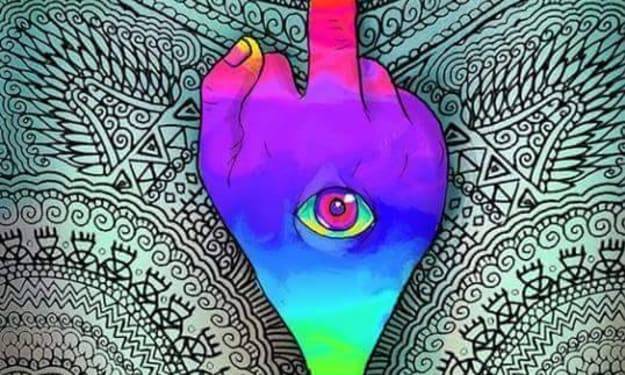Love Triangles and Betrayal: The Tricky Triad
Relationships and Other Challenging Affairs

Love triangles. . .
We don't understand the concept of a tricky triad, nor do we really comprehend the dynamics of being caught up in one, until we find ourselves stuck as a geometrical coordinate. Graphed as a third part of a whole, whether we initiate the third angle or were unknowingly reeled into it, stuck we are. Haphazardly, is often the case. Even for the dirty deed doer, the cheater, who branched out from the dyad.
Whether from a weakened bond with the initial love interest combined with fear of coping with being the dreaded "alone" or from an unexpected or rekindled bond with another, it's rarely a pre-meditated act, the development of the love triangle. It's more often a failure of decision making. An inability to determine what one wants, so instead he sits in limbo and allows himself to fester in his self-loathing...until one or both budding romances fade away from neglect, when the guilty party involuntarily shuts down, feels undeserving of happiness if he (or she!) is a good-at-heart type.
Every act of love toward one party is a betrayal of the other, and even logic fails when the analytical mind tries to apply reason to matters of the heart.
It's a toxic situation. If any of us knew how to fix it, we wouldn't find ourselves so often involved in them. Instead of looking for healthy solutions as a society, we seem to fixate on assigning guilt. It's an odd irony indeed, that the chronic waffler finally acts upon impulse when so often he pragmatically stagnates in uncertainty and ultimately, he finds himself paying the price when his action potential resonates negatively as a past mistake, and the cascading downward spiral is a consequence.
The selfish act should not necessarily be treated punitively, when exacted by a too-often unselfish person. It seems like it just needs a trajectory. A decisive plan, originated by the uncertain heart who resolves to "fix" his own mess. But the only way to do so is to limit his distractions, to minimize trivial fancies and focus instead on the basics.
Maslow's hierarchy of needs as a pyramid has often struck me as faulty logic from an imagery perspective. Often we're dealing with our basic needs concurrently while attempting to reach self-actualization, but uncertainty is not a failure.
It's the punishment suffered by the most open-minded. Those who love and accept others freely, so freely that they feel guilt for being selective when it comes to romantic matters. That is how we turn the judgment inward. We appear "lazy" due to our finicky indecision, when we really just want to escape the disappointment in ourselves, the disdain from others, that drowns us in the shame we've created for ourselves. The truth of the matter is that without acknowledgment and cooperation of all parties to understand, everyone gets hurt, including the one stuck in the middle.
The desire "not to hurt anyone" is often the intention of one who is hurting themselves but doesn't know how to heal. Is there shame in being reserved with actions? Is there shame in deception? Or are these actions the results of a society with preconceived notions that deception is the motive of a selfish person doesn't want to choose. Inaction itself is a choice, but often made by one who does not know himself.
The truth is that not all "cheaters" are selfish. Or cheaters at all. Even when the evidence unfolds, the heart that loves will understand and forgive. It does not always mean the romantic attachment should be reconciled, but the pain reverberated from being wronged can diminish in time. It requires the introspective initiator to be fair, to recognize the need to "own up" to his mistake, and face the consequences of his deception in the aftermath. To open up and be respectful of the ones trying to understand the mess they've been caught up in.
Or he can remain a spineless coward, choose to revert to his scared ways and allow the who was open-minded enough to share the blame fairly, to be the scapegoat. To the judgmental society that creates such "monsters" among us, often the most kind-hearted individuals are restricted by the social constructs that we perceive as strict guidelines of morality. Love is a battlefield, if we make it so.
But love doesn't take prisoners. It shouldn't. No one is a hostage of their own unrequited love. If he says he doesn't deserve you, chances are, he is right. He may be wonderful in all the right ways, but terrible in the one way that counts. The strongest party may have to detach and accept the weakness of others, but being alone to leave the culprit as an easier part of the other dyad opens you up to more opportunities, hopefully with someone who will choose YOU and only you.
It doesn't have to be considered a loss, to let go of a failed attachment. To look at it scientifically, search for a covalent bond in your next attachment, and recognize that no love triangle is an equilateral. Don't settle for weak attachment when your brand of love is stronger and deserves better. And don't be bitter. Not everyone is weak, just because you fell victim to love from a coward. It truly is his loss, and likely a mistake that will be repeated during his weak attachment to the other.
Not your problem. The indecision of a waffler is never your problem. Walking away with grace is the key. Because truly, you deserve better. So does he. So does she. But you do you, it's all you can do.
About the Creator
Amanda Karenina
I'm nobody.






Comments
There are no comments for this story
Be the first to respond and start the conversation.